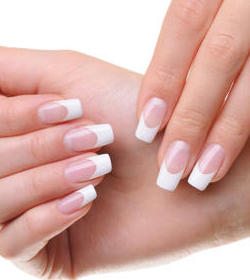
Among some of the pressures we put our teeth through; nail biting is one seemingly harmless activity. Biting your nails can in fact ruin more than just a pretty manicure, this bad habit can actually damage your teeth.
Nail biting is one of the most common habits that people of all ages do. Many people engage in this behavior unconsciously; most times out of boredom, nervousness, frustration or stress. The nails are one of the hardest surfaces of the body, so it should not come as a surprise that chomping down on one can apply enough force against your teeth to cause damage.
Read more: How to Cure Bad Breath Fast
Effects of Nail Biting
Biting your nails can result in cracks, chips or erosion of the front teeth from pressure and stress. Many nail biters experience tiny chips across their front teeth. More alarmingly, you can actually fracture the enamel on your teeth from excessive chewing on hard surfaces like finger nails. Frequent nail biters may notice that their teeth appear squared off or worn down. If you bite your nails regularly, you may also notice increased tooth sensitivity or even pain as the tooth enamel wears away.
In most severe cases, consistent nail biting can actually cause TMJ, a painful condition that causes jaw pain, headaches and popping or clicking of the jaw. Severe TMJ can cause problems with opening and closing the jaw properly. People with braces experience the worst complications from nail biting, since the teeth are already in a stressed position from the pressure of the braces. Prolonged nail biting can compromise the result of orthodontic treatment, cause root resorption or compromise the tooth alignment.
One of the even less appealing side-effects of nail biting is the possibility of transmitting bacteria from your fingers and under your fingernails to your mouth. The hand and the space under the nails harbor as many as 150 species of bacteria. Allowing these bacteria to enter the mouth can cause a world of troubles starting with the risk of illness, but also the increased risk of gum infections, bad breath and generally compromised dental health. If you think about all of the surfaces that you touch with your fingertips throughout the day, then you can imagine the various types of bacteria that you might have unknowingly picked up and put into your mouth.
Read more: Is Human Mouth Cleaner than a Dog’s?
How to Stop Biting Your Nails
There are ways to stop habitually nail biting. Most children and adolescents eventually grow out of the habit by age 30 or so, however habitual nail biters may need assistance stopping the habit. Here are a few ways to quit nail biting:
- Keep nails trimmed and filed neatly. Nails with uneven edges are often temptation for nail biters.
- Get manicures, acrylic nails or paint your nails. If you invest time and money into a nice manicure you are less likely to chew on your nails.
- Address the root cause of stress, anxiety or frustration that causes you to bite your nails. Try positive techniques to rechannel your nervous energy away from nail biting into stress-reducing activities.
- Have others help remind you. Aside from committing to stopping yourself, have friends or family members remind you when you start to nibble your nails.
- Try a special polish that has a bitter taste. Specially designed nail polishes like Orly Nails No Bite, Barielle No Bite Pro Growth, Mavala Stop or THUM.
Most importantly, if you want to stop biting your nails, you have to consciously commit to stopping your habit. Take the steps to make sure that you don’t chew your nails and eventually you will notice your nails grow longer and thicker.



